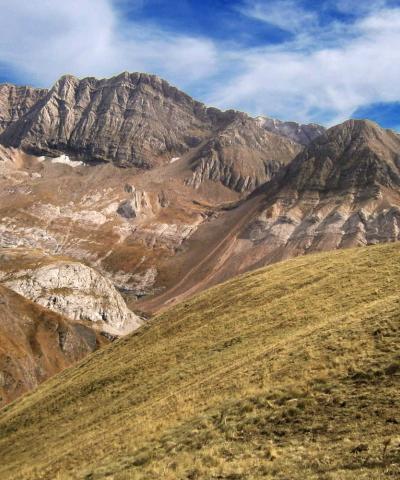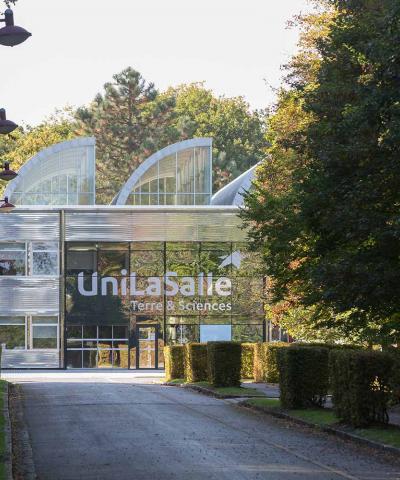Environmental challenges and associated risks, the search for diversified and sustainable sources of energy, the development of territories from land to sea, are at the heart of sedimentary geosciences.
The challenges of geo-energy and climate risks
By combining sedimentary, structural and marine geology, reservoir analysis and geo-modeling, the engineers trained will be able to identify energy resources, both fossil (hydrogen, uranium, hydrocarbons) and renewable (geothermal, marine energies), and the possible mixes within a territory undergoing energy transition.
These engineers will be able to implement geological solutions for carbon offsetting, as well as to evaluate risks and propose solutions for adapting to natural hazards accentuated by human activities (coastal erosion/retreat, impacts of floods and storms), and even optimize development from the coast to submerged areas.
Finally, the protection of the environment and the enhancement of the geological heritage are fundamental aspects supported by these engineers.
Details of the courses
Semester 7 - Subsurface DATA
Subsurface DATA Major
The major corresponds to the specific teachings of the course. It consists of course sequences and projects.
- Sampling and subsurface data analysis
- Near- and subsurface geophysical methods
- Project: Thesis of Initiation to Research 1
Minors
Each semester includes 2 blocks dedicated to minors, corresponding to 54 hours of complementary courses that allow the student to complete his training in a related field.
The proposed minors
Block 1: Identification of Geo, Bio Energies (Label Geo-bio energies) / Seaworld Mapping and Understanding / Automated Data Processing : Python Programming and Numerical Methods, Python and Advanced Methods / Scientific Approach - Research - Beginner / Innovating, Undertaking and Combating Creatic Attitudes
Block 2 : Advanced Spatial Analysis : Advanced spatial data processing (remote sensing, Python automation, 3D, Data Model, Webcasting) on ArcGIS / Scientific approach - Research - Beginner
Semester 8 - Sedimentary and marine geosciences
Major Sedimentary and marine geosciences
- Geological and Geophysical interpretation and synthesis
- Sequence Stratigraphy
- Project: Dissertation of Initiation to Research 2
Minors
Each semester includes 2 blocks dedicated to minors, corresponding to 54 hours of complementary courses that allow the student to complete his training in a related field.
The proposed minors
Block 1: MREs and Coastal Development / Quantification and production of Geo, Bio Energies (Label Geo-bio energies) / Scientific approach - Research - Intermediate / Sales techniques and commercial relationship / Project management: From forecasting to agile / Introduction to the Web: Developing a website
Block 2: Innovation, Carbon neutrality and Territories (Label Géo-bio énérgies) / 3D modeling: Design of 3D parts on Dassault Système solutions and 3D printing / Management field and application in Geoenergy and Geotechnics / Scientific approach - Research - Intermediate / Immersive entrepreneurship and design thinking
Semester 9 - "A la carte" major
In semester 9, you can orient your course according to your desires, by choosing among :
- the main major of the Geo-energies, climatic Risks and Territories track, which deepens this field (subject to modification): Geomodelisation, geo-energies and oceanography
- one or more opening majors, designed to broaden your skills in another field (subject to change):
- Numerics applied to geosciences
- QHSE, CSR, Risk manager
- Intrapreneurship, entrepreneurship and innovation
- a semester, a double degree or a degree-granting stay in France or abroad (from 12 to 18 months for a double degree or a degree-granting stay)
Sesmester 10 - End of Study Internship
The end-of-studies project is based on an internship in a company or a research internship for students, or on the long period in a company for students following an apprenticeship program.
It leads to the writing of a thesis and an oral defense.
What are the jobs after the Geo-energies, climatic Risks and Territories course?
The Geo-energies, climatic Risks and Territories course allows you to work in the exploration and production of renewable and fossil energies, in storage (gas, CO2, waste...), drilling, coastal management, marine campaigns, geophysical acquisitions, industrial cabling, research and development or services.
Some professions
- Design engineer / technical support
- Research / business engineer
- Project or team leader
- Head of studies / research / coastal mission
- Geosciences modeler
- Hydrographer
They welcome our engineers
45-8, ADEME, BAKER HUGHES, BEICIP, BRGM, CEREMA, CVA, ELIIS, ENGIE, EOLFI, EQUINOR, ESRI, EXXON, FRANCE ENERGIES MARINES, FUGRO, GEOLOG INT., GEOSTOCK, GEOXYZ, IFREMER, LDA, MAUREL & PROM, MODIS, ORANO, PERENCO, SAIPEM, SCHLUMBERGER, SPINERGIE, STORENGY, TOTALENERGIES, UNESCO, VERMILION...


